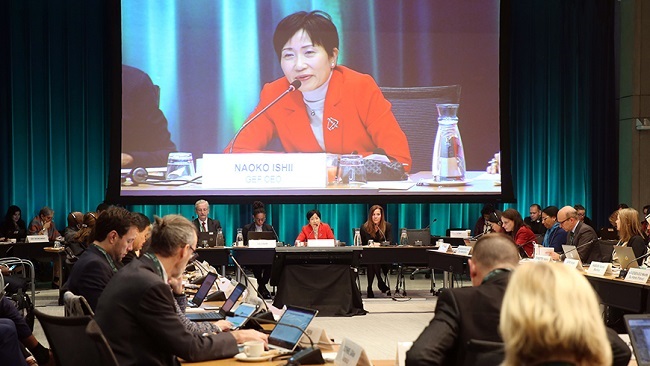Out of the several programmes and projects approved by the Global Environment Facility (GEF) at its 57th council meeting in Washington DC, Nigeria has been listed to benefit from three.

These include the Africa Mini-Grids, Global Cleantech Innovation and Food, Land Use and Restoration Impact programmes.
The Africa Mini-Grids Programme, for instance, will help Nigeria and 10 other African countries – Angola, Burkina Faso, Comoros, Djibouti, Eswatini, Ethiopia, Madagascar, Malawi, Somalia, and Sudan – increase clean energy access.
The Global Cleantech Innovation Programme, on the other hand, is designed to support clean technology entrepreneurship in developing countries such as Nigeria, Cambodia, Indonesia, Kazakhstan, Moldova, Morocco, South Africa, Turkey, Ukraine, and Uruguay, in support of lower carbon emissions.
Additionally, GEF has resolved to expand its Food, Land Use and Restoration Impact Programme to five more countries and Nigeria, Brazil, Paraguay, Uganda and India are the lucky beneficiaries.
The work programme approved by the GEF Council spans support for action on climate change, biodiversity, land degradation, chemicals and waste, and international waters, primarily with grant support, and was complemented by $35 million in non-grant instruments.
Some of the other programmes include:
- The Blue Nature Alliance, a new programme designed to support new and expanded marine protections and improved management of existing marine protected areas to safeguard the future health of the global ocean.
- The Inclusive Conservation Initiative, launched with Conservation International and IUCN, is a global project designed to directly support indigenous peoples’ stewardship of the lands, waters, and natural resources they control, to address the growing drivers of global environmental degradation.
- The Sustainable Cities Impact Programme, which builds on prior GEF work in support of green and sustainable cities, including through the World Bank-led Global Platform for Sustainable Cities. The new Impact Programme, led by the UN Environment Programme, will focus on supporting integrated urban planning, sustainable investments, and innovative financing and business models for private sector engagement at the city level. It includes $160 million of GEF support, leveraged by an expected $1.7 billion in co-financing, for activities in 24 cities across nine countries – Argentina, Brazil, China, Costa Rica, India, Indonesia, Morocco, Sierra Leone, and Rwanda.
- An expansion of the Implementing Sustainable Low and Non-Chemical Development in SIDS (ISLANDS) Programme to make three additional countries – Bahamas, Cuba, and Dominica – eligible for support, to address chemicals and marine plastics.
At the meeting, government representatives approved more than $600 million for two new work programmes that include innovative ventures to expand marine protected areas and engage indigenous peoples for biodiversity protection, and for climate change resilience-building efforts in least developed countries.
Representatives of GEF’s 183 country members, approved a set of five programmes and 48 projects, including four multi-trust fund projects, to be implemented in 87 developing and least developed countries. The $588.5 million in GEF Trust Fund financing approved by the GEF Council is expected to mobilise $5.6 billion in co-financing from other sources.
Additionally, the joint Council of the Least Developed Countries Fund (LDCF) and Special Climate Change Fund (SCCF) approved a $64.8 million work programme for climate change adaptation in the world’s poorest countries, comprising of nine projects, four of which are also supported by the GEF Trust Fund. The government of Belgium also announced a €15 million pledge to the LDCF during that meeting.
Naoko Ishii, CEO and Chairperson of the GEF, said she was heartened to see support for action on urgent environmental priorities ahead of a pivotal year for international negotiations on biodiversity and climate change, and amid increasing recognition by citizens and governments alike that nature is a foundation to sustainable development.
“I have witnessed a huge and increasing surge of interest, recognition and determination of how we can make the best use of this Super Year 2020,” she said, stressing the need for transformative change to the global economy in light of multiple pressures from climate change, biodiversity loss, and pressures from the global food system.
“We need to present how this transition will be navigated by working together. Our food, land use and restoration program, sustainable cities program, and forest management program are examples of how the transition may work. The GEF’s role is to present this pathway for a very challenging transition and show how we can work together,” she added.
The Council took several decisions concerned with updating GEF policies and operations, including minimum fiduciary standards, and agency compliance with environmental and social safeguards. The GEF private sector engagement strategy was also discussed, with the Council inviting the GEF Private Sector Advisory Group to continue until the end of the GEF-7 replenishment cycle.
In the 27th LDCF/SCCF Council meeting, the Belgian Ambassador to the United States, Dirk Wouters, said his government had made the €15 million pledge to support the immediate needs of the least developed countries, and he emphasised the European Union’s commitment to support climate action.
The governments of Canada, Denmark, Germany, the Netherlands, and Sweden also reconfirmed the pledges they announced for the LDCF in September.
Council Member Gillian Guthrie of Jamaica, who co-chaired the 57th GEF Council meeting, underlined the importance of Global Environment Facility assistance to environmental and climate efforts across developing countries.
“The GEF remains a very important global mechanism for development, especially in our recipient countries,” she said.
Ali’ioaiga Feturi Elisaia of Samoa, who represented the constituency including Cook Islands, Fiji, Indonesia, Kiribati, Marshall Islands, Micronesia, Nauru, Niue, Palau, Papua New Guinea, Philippines, Samoa, Solomon Islands, Timor Leste, Tonga, Tuvalu, and Vanuatu at the GEF Council, also stressed the value of the GEF partnership and commitment to shared action, particularly in the face of global warming.
“The sum of all our contributions is what allows us to address the impact of climate change,” he told the final session.
